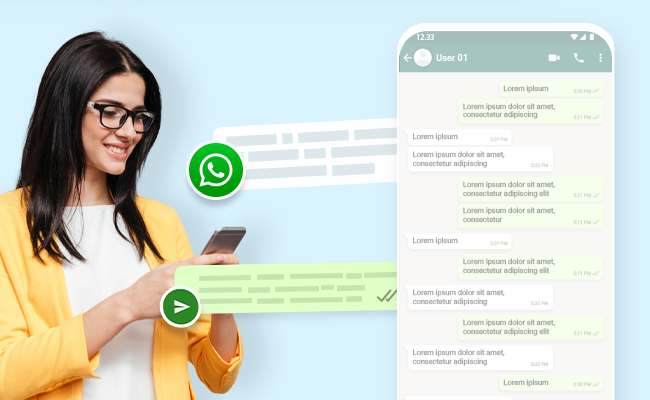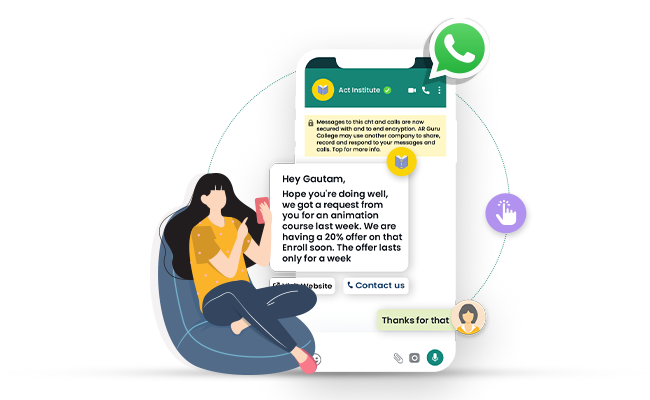Real-time conversations are crucial to answer a customer’s question as soon as possible in order to maintain customer satisfaction, save time, manage reputation, retain customers, and gain a competitive advantage.
Customers expect prompt and efficient solutions to their problems. By responding quickly to their questions, you can enhance their satisfaction and increase the likelihood of their continued brand loyalty.
Swift responses not only save the customer time but also optimise the efficiency of your support team. Furthermore, providing timely solutions contributes to higher customer retention rates, as satisfied customers are more likely to remain loyal and continue making purchases.
In addition to customer satisfaction, real-time conversations offer distinct advantages over competitors. By demonstrating your company’s commitment to exceptional customer service and responsiveness, you can gain a competitive edge. Maintaining a swift and immediate response to customer inquiries also helps to uphold the positive reputation of your company.
Moreover, a positive customer experience often leads to word-of-mouth marketing. Satisfied customers are more inclined to recommend your company to others, expanding your customer base and generating valuable referrals
Why is WhatsApp the Best Option for Customer Service?
With over two billion active users, WhatsApp is one of the most popular messaging services in the world. This indicates that a large number of customers are accustomed to using WhatsApp and feel at ease doing so for customer service.
Customers can get prompt answers to their questions thanks to the instant messaging app WhatsApp. Customers won’t have to wait too long to get answers to their problems thanks to this.
Text, image, video, and audio messages are all supported by WhatsApp as multimodal messages. This makes it possible for the customer and the support staff to communicate effectively, which facilitates the resolution of challenging problems.
WhatsApp has a feature called end-to-end encryption that guarantees the confidentiality and security of all messages. Because of this, clients can feel at ease sharing private information with the support team.
Customers frequently choose WhatsApp for customer service due to its availability and convenience. By using WhatsApp for customer service and catering to customer preferences, businesses can better satisfy their clients.
Setting Up WhatsApp for Business for Customer Service

Here are the steps for setting up a WhatsApp Business account for customer service
1. Creating a WhatsApp Business Account
- One of the essential requirements for setting up a WhatsApp business login/ account is that the client’s website must be operational. Particularly in the case of educational institutions.
- Facebook Business Manager account that has been verified – This is the second essential requirement.
- The third essential requirement is the phone number you intend to use to access WhatsApp. Verify that this number is capable of receiving OTP via voice call or SMS and that it is not already connected to any WhatsApp accounts.If the phone number is on the WhatsApp or WhatsApp Business app, the account should be deleted. under Settings > Account, by choosing Delete my account.Do not simply uninstall the account; ensure that it is deleted.
2. Adding Business Information, Such As A Profile Picture And Description
Include information about your business, including your name, profile picture, and description. Make sure that your profile’s picture and description accurately reflect your business and brand

3. Customising Greeting And Away Messages
To make customers feel welcome and let them know when to expect a response, personalise your greeting and away messages.
4. Configuring Quick Replies and Automated Messages
Create quick replies for frequently asked questions to save time. Using quick replies, you can send customers pre-written messages in a hurry. To quickly respond to customer inquiries, create automated messages. Using keywords or phrases, automated messages can be configured to send out basic information about your business
Using WhatsApp for Customer Service
Below are the various applications of Whatsapp for customer service
1. Responding To Customer Inquiries And Complaints Quickly Or With Chat Bot In Initially

WhatsApp is an efficient platform for addressing customer questions and complaints, offering the flexibility to utilise chatbots or human agents. Some of the key points to consider are
- Human customer service representatives can respond personally and empathetically to customer inquiries, understanding their concerns and offering tailored solutions or workarounds. This personalised approach contributes to higher levels of customer satisfaction, loyalty, and retention.
- Implementing WhatsApp chatbots enables businesses to promptly and automatically handle frequently asked questions, freeing up human agents to focus on more complex inquiries. This division of tasks ensures efficient handling of customer interactions.
- The availability of WhatsApp customer service 24/7 allows for immediate assistance even beyond regular business hours. This feature reduces customer waiting time and enhances overall customer happiness.
- A hybrid approach, involving the initial interaction with a chatbot followed by a seamless transfer to a human agent, can be employed. This approach ensures a smooth customer experience while maximising the effectiveness of the support team.
- By leveraging the capabilities of WhatsApp, businesses can effectively manage customer queries, optimise response times, and create a positive and satisfactory customer experience
2. Sending Personalised Messages And Promotions
WhatsApp makes it simple to send personalised messages and promotions to customers.
Businesses can use WhatsApp to send clients personalised messages based on the clients’ preferences, actions, and previous purchases. This might increase patron engagement, loyalty, and trust.
Businesses can use WhatsApp to send clients personalised messages based on the clients’ preferences, actions, and previous purchases. This might increase patron engagement, loyalty, and trust. With WhatsApp, it’s simple to send customers personalised messages and promotions

3. Handling Multiple Conversations At Once
WhatsApp is an effective tool for managing multiple conversations simultaneously, making it valuable for providing efficient customer service. The primary considerations are as follows
- The WhatsApp Business API allows businesses to handle numerous conversations from a single interface, streamlining the management of client inquiries and complaints.
- Automation, message routing, and chat tracking tools provided by the API facilitate the handling of a high volume of customer interactions by support teams.
- To enhance tracking and prioritisation, businesses can label and tag conversations on WhatsApp based on query type, urgency, or status.
- Quick responses, which are pre-written messages, can be customised and sent with just one click, saving time and effort for the support staff.
- WhatsApp enables effective communication and teamwork among support teams, allowing conversations to be assigned or transferred to specific team members based on their expertise or workload.
- Chatbots, computer programs designed to handle multiple conversations simultaneously, can swiftly and automatically address common queries, allowing human agents to focus on more complex issues.
- These tools collectively assist businesses in efficiently managing a large volume of customer inquiries and complaints, leading to increased customer satisfaction and loyalty.
Businesses may speed up existing customer support processes, manage a significant number of enquiries, and improve overall customer happiness and loyalty by utilising WhatsApp’s features
4. Managing Customer Data And Privacy

WhatsApp prioritises the security and privacy of its users, including businesses utilising the platform for customer service
- WhatsApp employs end-to-end encryption to safeguard the security and privacy of messages and calls. This means that only the sender and recipient can access the contents of the messages, making it difficult for external parties to intercept or access them.
- The platform complies with privacy regulations such as the General Data Protection Regulation (GDPR) and the California Consumer Privacy Act (CCPA). It ensures that customer data is handled and stored securely, and customers maintain control over their own data.
- WhatsApp requires users to opt-in before receiving messages from businesses, ensuring that customers have control over the messages they receive. Businesses are prohibited from sending messages to customers who have not provided their consent.
- Prior consent is essential for businesses to use customer data for marketing or other purposes. WhatsApp provides tools for businesses to manage customer preferences and secure their consent, allowing for transparent and accountable data practices.
- Businesses can delete customer data from WhatsApp servers once it is no longer necessary, ensuring that customer data is only utilised for its intended purpose and not stored indefinitely
WhatsApp protects user information and guarantees that companies using the platform for customer service respect user preferences and uphold data privacy by complying to strict security measures and privacy rules.
Best Practices For WhatsApp Customer Service
When using WhatsApp for customer service, it’s critical to follow best practices to ensure that customers receive prompt, knowledgeable responses. Top recommendations for using WhatsApp for customer service include the following
a) Being Prompt And Professional In Responses

When using WhatsApp for customer service, it’s important to respond quickly and professionally.
People who use WhatsApp and other messaging services expect timely replies. It’s crucial to address customer questions and issues as promptly as possible.
By setting clear expectations for response times, you can effectively manage customer expectations. Always remember to maintain a courteous and professional tone, using proper grammar and avoiding slang in your communication.
Personalisation plays a significant role in improving customer engagement and trust on WhatsApp. Take advantage of customer data to personalise your messages and make them more relevant to each recipient.
By tailoring your communication, you can create a stronger connection between your brand and the customer. This approach shows that you value their individual needs and preferences, resulting in increased customer engagement and trust.
To provide excellent customer service through WhatsApp, ensure your support team receives proper training. Equip them with the necessary materials and tools to effectively handle customer inquiries and resolve issues.
By empowering your support team, you enable them to provide exceptional customer service. This, in turn, leads to higher customer satisfaction and loyalty. Make sure your support team is well-prepared to serve customers on WhatsApp by providing the training and resources they need.
b) Avoiding Spamming And Over-Messaging
While using WhatsApp for customer service, it’s crucial to follow best practices to prevent spamming and excessive messaging.
Always ensure that your customers have given their consent to receive messages from your business.
You can obtain consent through opt-in messaging or by clearly stating the types and frequency of messages they can expect from you.
By sending valuable and relevant messages, you can increase customer engagement.
Avoid sending group chats or unsolicited messages without consent, as customers may report or block your business for spamming.
Maintain a mindful approach to how often you communicate with your customers. Avoid sending inappropriate or excessively frequent messages, especially during inappropriate times like late at night.
Respecting your customers’ preferences is essential. Allow them to choose the frequency at which they receive messages from your business. This way, you give them control over their messaging experience, fostering a positive relationship with your brand.
You can make sure that your WhatsApp customer support interactions are respectful and successful by following these best practices.
The key to preventing spamming and over-messaging is getting clients’ permission, providing them useful information, and respecting their choices for frequency.
Make an effort to include educational, distinctive, and pertinent content in your messages.
By doing this, you not only avoid any potential problems with customers reporting or blocking your company, but you also strengthen your relationship with your audience by showing them that you appreciate and trust them.
c) Being Transparent About Business Policies And Procedures
It’s essential to adhere to established standards to maintain transparency while utilising WhatsApp for customer service. Make sure to provide a clear and straightforward explanation of the policies and practices of your company.
This includes details about guarantees, exchanges, and shipping and delivery. Consider using standard messages to preserve consistency and transparency. Confusion is lessened, and client pleasure is increased.
Additionally, make it simple for clients to locate your contact information, such as phone numbers, email addresses, and physical addresses. They will be able to simply get in touch with you if they have any queries or worries.
Transparency is essential, so accurately describe your company’s policies and practices.
That involves dealing with crucial issues like warranties, return policies, and delivery options. Use standardised communications to maintain consistency and openness.
This lessens misunderstanding and improves client satisfaction. Also, don’t forget to include your contact information.
Share your contact information, including your phone number, email, and physical address. Customers are more likely to contact you with queries or problems if they are able to locate you easily.
d) Offering Personalised And Proactive Customer Service
When using WhatsApp for customer service, you can improve the customer experience and encourage customer loyalty by providing individualised and proactive customer service. Client inquiries and complaints should be responded to right away.
Customers should receive real-time assistance, and you should make every effort to address their issues as quickly as you can. Proactively foresee customer needs and offer remedies before they ask.
This could involve providing relevant products or services based on previous purchases or providing relevant information before inquiries from customers. Make your communications more tailored and specific by using customer information.
Customers should receive personalised recommendations based on their prior interactions and purchases, and they should be addressed by name.



